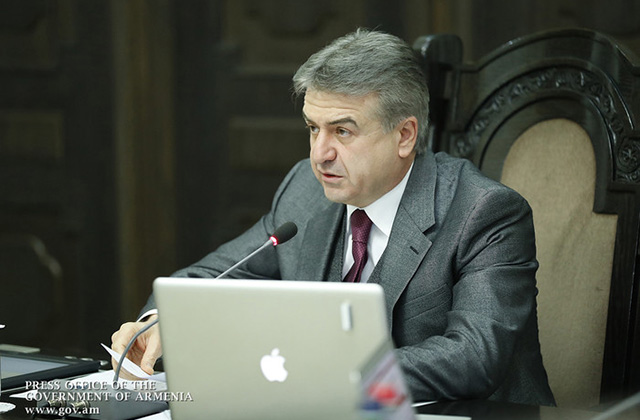Administrative Court’s workload may create serious risks – PM Karapetyan issues relevant instructions

A Cabinet sitting was held on November 9, chaired by Prime Minister Karen Karapetyan, the press service of the Government of Armenia reported.
Prior to discussing the agenda items, the Prime Minister instructed those responsible to improve the quality of appeals by administrative procedures. “Unlike the judicial appeal, the appealing of administrative acts by administrative procedure is free of charge and takes a relatively short period of time to complete. However, our surveys have shown that administrative acts are mostly appealed in judicial order. The problem is particularly driven by the fact that the rulings on administrative appeals are often issued based on insufficient reasoning or other practical shortcomings to ensure the integrity of examination. At the same time, those complaints rejected by administrative procedure are often complied with following court proceedings. There are nearly 9,200 cases being examined in the Administrative Court as of November, 2017. The date of the first trial session for them will be set in January 2018, while the case itself will be examined by the Court of Appeal no sooner than in 2019,” the Prime Minister said, adding that the aforementioned workload of the Administrative Court may lead to serious risks in terms of preventing citizens from being provided a fair trial and protecting the business environment.
To this end, the Prime Minister gave 2 months’ time to the Ministers of Justice, Transport, Communication and Information Technologies, Agriculture, the State Revenue Committee Chairman, the Chief of Police and the Mayor of Yerevan to submit to the Government Staff proposals and recommendations for enhancing the quality, reasonableness, effectiveness and transparency of administrative appeals.
The Government adopted a relevant decision to provide citizens of Armenia with wider access to affordable heart surgery services on a privileged basis. It is proposed to increase the total budget of the Cardiac Surgery Services Program by AMD 194,477.6 thousand at the expense of deductions that will result in additional reimbursements provided for 220 heart surgeries by the end of 2017.
The Executive approved a document referred to as Public-Private Sector Partnership Policy in the Republic of Armenia. By the same decision, the Ministry of Economic Development and Investments was tasked to elaborate and submit to the Government Staff a draft law resulting from the foregoing document. The reference note says that the Government of the Republic of Armenia has assumed a commitment to formulating a comprehensive and systemic approach to all transactions implemented in PPP format. The implementation of PPP will help develop infrastructure, attract foreign direct investment, mobilize the private sector’s financial and other resources, as well as to ensure effective implementation of the public-private sector dialogue.
The Government made amendments and additions to one of its previous decisions. The amendment suggests that individuals with long entrepreneurship experience in various sectors of the economy might be appointed to serve as Armenia’s commercial attaches and trade representations in foreign countries.
Due to the need for exercising electronic surveillance over the beneficiaries of the probation, the Government approved a procedure to follow in using and financing the facilities of electronic surveillance.
The Government will allocate 20 million drams to cover 60 percent of tuition fees for 73 Syrian-Armenian students. According to the reference note, 302 Syrian-Armenian students currently need compensation for tuition fees. The balance shall be settled through funds available from the Armenian General Benevolent Union and Galoust Gulbenkian Foundation.
The meeting endorsed the proposal to sign a Visa Facilitation Agreement between the Government of the Republic of Armenia and the Government of the Kingdom of Denmark. The agreement seeks to facilitate the issuance of visas to the citizens of the Kingdom of Denmark and other Schengen Zone-member States for not more than 90 days for each period of 180 days.
The Cabinet approved a € 80 million-worth draft loan agreement based on multi-vector policy between the Republic of Armenia, in the face of the Ministry of Finance, and the Reconstruction Credit Institute (KfW Bank).

























